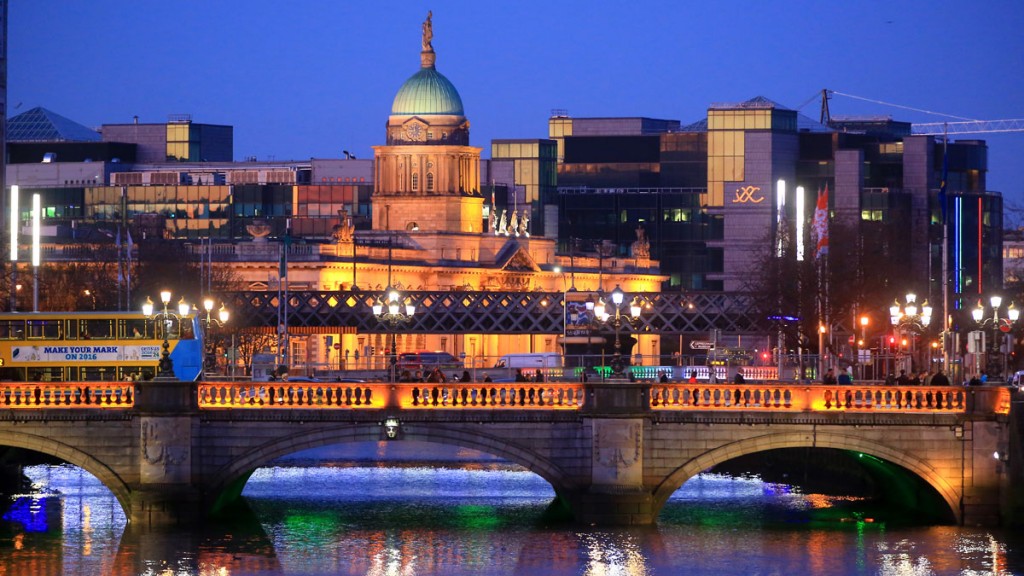
One of the factors that will determine whether Brexit is a success or not is the effect it has on Britain’s financial services industry, which provides a huge amount of tax revenue and around 10% of GDP.
Critics warn that restrictions on selling products and services to the rest of Europe will lead to companies relocating abroad, with knock-on effects on other industries. However, others argue that even if the City does face barriers, firms will ultimately choose to stay put. As well as the language barrier, continental cities such as Frankfurt and Paris are perceived as less business-friendly, with much higher rates of personal taxation (a key factor for high-earning bankers and lawyers).
However, the challenge from Dublin is much harder to dismiss. Even before Britain voted to leave, the Irish capital’s location, low rates of taxation and openness to foreign investment meant that it was rapidly turning into a major European financial centre.
One person who has been closely monitoring the situation from the Irish side is Mary Rose Burke, CEO of Dublin’s Chamber of Commerce. Before she became CEO, Burke worked for Ibec, Ireland’s main business federation, giving her an insight into what Irish business as a whole thinks about how things are developing.
Burke believes that “there has been growing activity since the June referendum”, with London firms talking to commercial property companies and office developers about relocating. Initially this just consisted of “companies making brief trips [to Dublin] to scope out opportunities”. However, in the past few weeks, “we’ve had second visits from people who initially expressed an interest” and these have involved “key decision makers”, again indicating that firms are truly serious about this. While companies are still “being discreet” about the fact that they are considering moving, “things are definitely going on, albeit quietly”.
The two types of business keen to move
While all parts of the financial sector are affected, Burke thinks that two types of firms are particularly eager to shift their operations. Insurance companies are very worried that the potential loss of “passporting” rights will make it much more difficult to do business with the continent.
Law firms are also concerned about their ability to bid for legal work in Europe after Britain formally leaves the EU. As a result, they are looking to get around this by shifting at least part of their operations to Ireland, which is only a short flight away (or in the case of Belfast, a 90-minute car journey).
Burke emphasises that, whatever happens, Ireland and the UK will maintain warm relations, with strong cultural and social links. However, this isn’t stopping both Dublin and Ireland as a whole from “making sure that the world knows that it is open for business”.
Indeed, Burke expects that any turn towards protectionism in Britain and the US will lead to global firms searching for a country that is more outward-looking. To help with any short-run disruption, Ireland has significantly boosted funding for its two main development agencies, Enterprise Ireland (which helps Irish exporters) and IDA Ireland (which gives foreign firms incentives to come to Ireland).
At the moment one of the big issues is how Brexit will affect the longstanding Common Travel Area between Ireland and the UK. This arrangement, which dates from 1923, essentially allows free movement for Irish and UK nationals between the two countries without any border controls. There have been worries that it could fall foul of both EU law and Britain’s desire to restrict immigration. However, Burke is confident that the agreement will continue in some form, as both the UK government and the other EU countries “accept that Ireland has a unique position”, which needs to be respected.
One idea that is very definitely not on the cards is any prospect of “Irexit” – Ireland deciding to follow the UK out of the EU. While a few fringe figures, including a retired diplomat, have endorsed the idea, Burke sees such talk as “kite flying” and “opportunistic”, from people with their own agendas. She certainly “hasn’t seen anything that would support such sentiments”. Indeed, she firmly believes that the Irish population is “much more supportive of the EU than the UK”, with general agreement that the Republic has “benefited greatly from EU membership”.